SNAP-Villanova continues a championship year at NSNA Convention
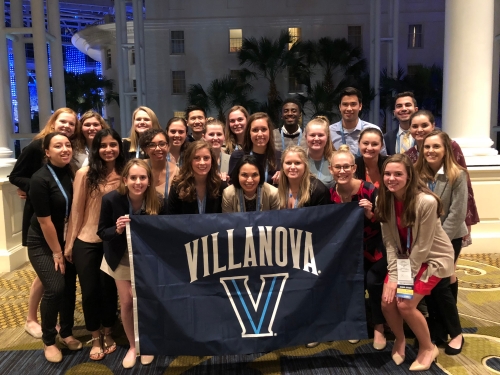
Members of SNAP-Villanova at NSNA convention, Opryland, Nashville, Tenn.
Villanova’s delegation to the 66th annual convention of the National Student Nurses' Association (NSNA) in Nashville, Tenn. (April 4-8, 2018) continued the university’s championship year. One of few chapters to have earned national Stellar School designation from the NSNA, Villanova’s chapter of the Student Nurses’ Association of Pennsylvania (SNAP-Villanova) currently holds the state SNAP’s highest chapter award for Chapter Excellence (Category 2). With 25 nursing students from the traditional, transfer and BSN Express programs together, Villanova’s delegation reflected the diversity of age and backgrounds of the nursing workforce.
The delegation was led by 2017 SNAP-Villanova President Katrina Garzon ’18 FCN and accompanied by their advisor, Carol Toussie Weingarten, PhD, RN, ANEF, associate professor. Garzon previously served as state SNAP Secretary-Treasurer and a member of the national Scholarship Selection Committee. In Fall, 2017 she completed an independent study in leadership linked to the Student Nurses Association. Her article, “The Meaning President: What Leadership of a Chapter Truly Entails,” will be published in the Fall, 2018 issue of NSNA’s Imprint: The Professional Magazine for Nursing Students (circulation >65,000).
Villanovans were active throughout the convention, and their involvement reflects roles on the chapter, state and national levels. Meghan Scanlon ’19 FCN, 2018 president of SNAP-Villanova, and vice president of the state SNAP, was visible at the convention in her role on the national Resolutions Committee. Scanlon appreciated “…the chance to work with students from many chapters as they transformed their passionate commitment to issues affecting nursing, nursing students and health care into NSNA policy and action.” Serving in leadership roles on the chapter, state and national levels has shown Scanlon how each group connects and “…the importance of the networks nursing students can form through our involvement.” She attributes her own success to “…the help and support of the Villanova nursing family.”
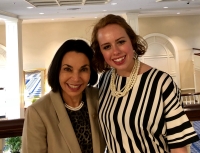
Advisor Dr. Carol Weingarten with state SNAP president and Villanova chapter vice president Madeline Stadler.
Villanova’s resolution, focusing on education about attitudes toward the elderly, was co-authored and presented by Meghan Chirichella ’18 FCN, Cameron Cook ’18 FCN, and Katrina Garzon. Passed by the NSNA House of Delegates, it is now policy of the association. In addition to the impact on NSNA and nursing students, the process of crafting and presenting resolutions simulates activities within professional and civic organizations and legislatures.
As state SNAP president, Madeline Stadler ’19 FCN led Pennsylvania’s delegation and chaired the state caucus meetings at the convention. Stadler is also SNAP-Villanova vice president and has served on the national Scholarship Selection Committee.
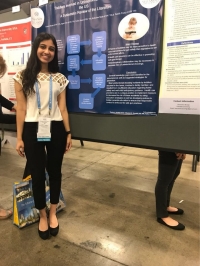
Anika Nana presents her group’s poster in the Exhibit Hall at the NSNA convention.
Within the large Exhibit Hall, the NSNA convention included poster sessions showcasing research and special projects done by students and chapters. Reflecting the growth and scholarship of the sessions and the needs of faculty and other nurses attending the convention, continuing education (CE) credit was available for registered nurses. Under the leadership of Evelyn Lengetti, PhD, RN-BC, assistant dean and director, the College’s Continuing Education in Nursing and Healthcare Program sponsored the CE contact hours. Villanova is approved by the American Nurses Credentialing Center (ANCC) as a provider of Continuing Education, required for renewal of licenses for registered nurses.
Three posters were presented by Villanovans, and the posters represented undergraduate research, course projects and an independent study based on international service. On behalf of her research group, including Lauren Munter ’19 FCN, Agnes Cho ’18 FCN, Katherine Mohr ‘19 FCN and Patrick Treacy ’20 FCN, Anika Nana ’19 FCN presented a poster describing their integrative review of literature focusing on toddlers involved in unintentional shootings in the United States.
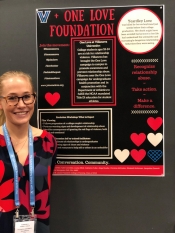
Kimmy Conlan presents her poster in the exhibit hall of the NSNA convention
Kimberley (Kimmy) Conlan represented classmates Tyler Connellan ’18 FCN, Catherine Fuller ’18 FCN, Louisa Elliott ’18 FCN, Abigal Koeller ’18 FCN, Christina McCusker ’18 FCN, Elizabeth McKernan ’18 FCN, and Jacqueline Zaweski ’18 FCN as she presented their poster based upon their project in the senior Health Promotion and Community Health practicum (NUR 4113). Focusing on the topic of relationship abuse in young adult university students, ages 18-24, the poster also included the students’ interdisciplinary collaboration with Villanova’s Office of Health Promotion, Department of Athletics and Title IX Coordinator.
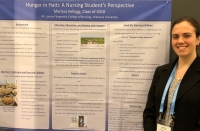
Meghan Galvin presents Marisa Kellogg’s poster about her work in Haiti.
Marissa Kellogg’s poster evolved from her independent study based on her work in Haiti with the group, Feed My Starving Children (FMSC). Her poster was presented at the convention by Meghan Galvin ’19 FCN, as Marissa was leading a FMSC service project at that time.
A scholarship for excellence was received by BSN Express student Linda Ruggiero, who earned a PhD in Neuroscience before embarking on a nursing career.
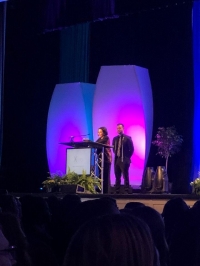
Dr. Carol Weingarten addressing the NSNA convention at opening ceremonies
Dr. Weingarten was active at the convention in her roles as Villanova’s advisor and as president of the Board of Trustees of the Foundation of the National Student Nurses Association (FNSNA). The FNSNA is the philanthropic arm of the NSNA. In addition to presentations at Opening Ceremonies for the convention and at the start of the House of Delegates (student “Congress”), she served on a Best Practice Panel for a faculty workshop and presented two focus sessions on her experiences working with staff and ill and wounded troops at Landstuhl Regional Medical Center in Germany and the unexpected and important career impact of professional involvement. At the conclusion of the session, she was recognized for her work by members of the Army Nurse Corps who were present with the Army exhibit at the convention.
As Katrina Garzon well summarized, “Our late Dean Fitzpatrick again would have been proud of SNAP-Villanova. She founded the chapter and believed strongly that undergraduate professional involvement was critical to nursing education. The chapter’s excellence and championship year are part of her legacy.”
